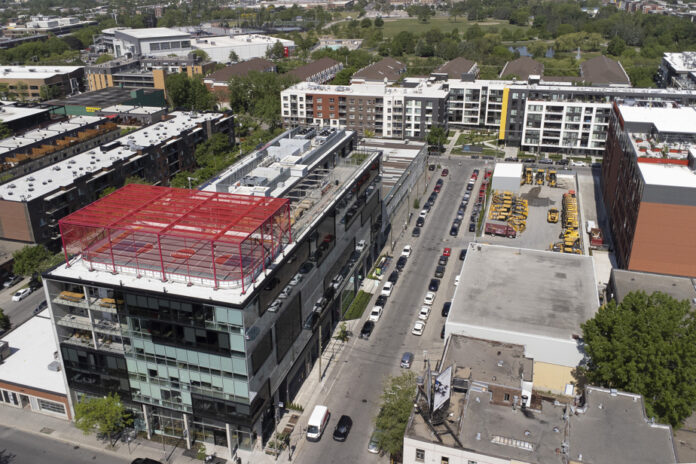It is not Pierre-Antoine Fernet who will complain about the abandonment of referendums at the municipal level as proposed by a provincial government bill. A 25 million investment was almost blocked by disgruntled neighbors. Still shaken by recent events, the promoter finds it useful to make his perspective known.
Mr. Fernet built Fabrik8, a co-working space at WeWork, with a Quebec touch. He maintains that his office building is crowded. The place is known for its ice rink installed on the roof of the building. The decor was used for the filming of advertisements, for Hockey Experts in particular. At the end of May, a charity soccer tournament was organized there.
With the success achieved with the initial phase, Mr. Fernet wants to expand. He had acquired the neighboring building, at 7240, rue Waverly, in 2015. This building housed the headquarters of the Liberal Party of Quebec when the latter was the subject of a search by the Permanent Anti-Corruption Unit (UPAC) in 2013.
“As a developer, says Mr. Fernet, we are 100% aligned with the City’s vision, the 15-minute city. I want to be well integrated, well accepted by citizens, offer local shops, preserve employment areas in Montreal. »
The two-storey building does not look like much. The zoning does not provide for residential use. Mr. Fernet obtained an exemption to build a new office building 32 meters, one meter higher than what is authorized, and to increase the area from 7400 square meters to 9750 square meters. Shops are planned on the ground floor.
“On the real estate project located at 7240, rue Waverly, the CJV [Comité Jacques-Viger] sees favorably the construction of phase 2, which offers spaces promoting the vitality of the employment center while offering services to the community,” the committee wrote in July 2022. The project also received a favorable recommendation from the Planning Advisory Committee on December 14, 2022.
Everything was going well until neighbors, many of whom live in the Atelier Castelnau condos across the street, objected to the project. They obtained the required signatures at the opening of the register.
La Presse spoke to two of them, Suzanne Lacroix and David Avond. They find the projected building too high, they don’t like its architecture, they complain about the noise generated by the ice rink of phase 1 and the car traffic, they don’t want to see offices, they prefer housing, they support that the planned glazed basketball court on the roof would create light pollution, among other things.
“At first, I was hesitant to speak publicly about my experience,” said Mr. Fernet, in an interview, “but I think things have to change. It is not normal that all the professionals of the city, after continuous exchanges with the promoter for 18 months, authorize a project so that at the end of the track, 12 people, having no expertise, have the right to speak out against the project even if their opposition has nothing to do with the nature of the exemptions requested. »
The provincial government is also proposing in its Bill 16, currently under study in parliamentary committee, exemptions to referendum approval for urban densification and municipal projects.
Proponents of referendums argue the value of giving citizens the power to curb a neighboring project that is diminishing their quality of life. Its detractors argue that the referendum is a denial of democracy because the process is unclear, which opens the door to misinformation, on one side or the other.
Still, on the day of the register, Thursday, May 25, the group of opponents failed to obtain the 234 signatures required to launch the referendum process. The borough had warned Mr. Fernet that his project would not proceed if that had been the case.
“After 18 months of effort, I was in complete uncertainty for three months because the City could cancel my project if the opponents collected enough signatures. I had to put everything on hold: plans and contracts. Time to restart the machine, my project will be delayed for another three to four months. In all, the opening of the registry will cause delays of six to eight months,” he complains.
Chaired by Brigitte Mathers, daughter of Jean-Guy Mathers, who died in 2018, Gestion Mathers sold 242,000 square meters of industrial land for $64 million last month. The Mathers operate the Saint-Eustache flea market and drive-in theater. The lot that has just been sold is located in the southwest quadrant at the crossroads of highways 13 and 640, in Boisbriand. It adjoins the Saint-Eustache quarry which the family sold to Lafarge in June 2020, more than two years after the death of the founder of the family business. The recent transaction was notified to us by broker Landerz and its publication Marketwatch MTL.
The buyer of the lot is the Société en commandite Développements Boisbriand, owned by Benoit Dumoulin. The latter being out of the country, he did not communicate his projects to us.
For her part, Brigitte Mathers indicated, in an email, that the land should be used to expand the quarry, which had been refused by the City of Boisbriand. Following the disposal of the quarry, the group no longer needs the land, she said.
Skyline, a private real estate investment trust in Guelph, Ontario, has acquired 465 Sicard Street, Mascouche, part of the Quartier 7 residential subdivision. The transaction disclosed by the acquirer involves a property comprising 106 apartments spread over 10 floors. The purchase price is 35.9 million.
The neighborhood is located near the Mascouche commuter train station. Previously, the same fund had acquired 405 and 455, rue Sicard. In all, Skyline owns six buildings in this city in the northern crown of the Montreal region. A call placed with the seller Gestion Danam Lacourse, of Terrebonne, who retains management of the property, was not followed up.















